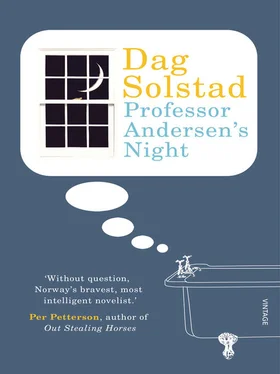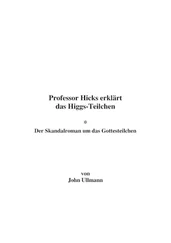Dag Solstad - Professor Andersen's Night
Здесь есть возможность читать онлайн «Dag Solstad - Professor Andersen's Night» весь текст электронной книги совершенно бесплатно (целиком полную версию без сокращений). В некоторых случаях можно слушать аудио, скачать через торрент в формате fb2 и присутствует краткое содержание. Год выпуска: 2011, Издательство: Harvill Secker, Жанр: Современная проза, на английском языке. Описание произведения, (предисловие) а так же отзывы посетителей доступны на портале библиотеки ЛибКат.
- Название:Professor Andersen's Night
- Автор:
- Издательство:Harvill Secker
- Жанр:
- Год:2011
- ISBN:нет данных
- Рейтинг книги:3 / 5. Голосов: 1
-
Избранное:Добавить в избранное
- Отзывы:
-
Ваша оценка:
- 60
- 1
- 2
- 3
- 4
- 5
Professor Andersen's Night: краткое содержание, описание и аннотация
Предлагаем к чтению аннотацию, описание, краткое содержание или предисловие (зависит от того, что написал сам автор книги «Professor Andersen's Night»). Если вы не нашли необходимую информацию о книге — напишите в комментариях, мы постараемся отыскать её.
Professor Andersen fails to report the crime. The days pass, and he becomes paralysed by indecision. Desperate for respite, the professor sets off to a local sushi bar, only to find himself face to face with the murderer.
Professor Andersen's Night
Professor Andersen's Night — читать онлайн бесплатно полную книгу (весь текст) целиком
Ниже представлен текст книги, разбитый по страницам. Система сохранения места последней прочитанной страницы, позволяет с удобством читать онлайн бесплатно книгу «Professor Andersen's Night», без необходимости каждый раз заново искать на чём Вы остановились. Поставьте закладку, и сможете в любой момент перейти на страницу, на которой закончили чтение.
Интервал:
Закладка:
They stood up. They had been sitting in the crowded ski cabin for several hours. It had already begun to grow dark outside, the daylight hours are so short up here in the north in December. They had a place at a large table for six at first, but moved over to a table for two when it became vacant. Throughout the tirades and the discussion which arose, Professor Andersen had got up twice and stood in the queue to buy them coffee; on one occasion he had also brought a plate with two Danish pastries back to the table. New skiers kept coming into the ski cabin, bringing with them a whiff of fresh snow and wind into the packed, slightly clammy premises. There was the tramp of boots, the smell of ski wax, and of caps and mittens and scarfs. However, when Professor Andersen and his colleague got up and left, it was beginning to thin out.
They fastened their skis on and took hold of their ski poles. His colleague sped off down the slope, in the tracks between the silver-grey and gloomy fir trees, and came to a halt down there to wait for Professor Andersen, who was still standing at the top and taking his time. He calculated his own route down with as long and wide turns as possible, before setting off downhill and completing the downhill slopes in accordance with his calculations, wobbling down-wards without falling, and not without a certain inherited mastery over his skis, unfit though he was. At the bottom his colleague was still waiting, and they continued together across the open, gently sloping ground, his colleague first and Professor Andersen after him, a little out of breath, despite the fact that his colleague went at as slow a pace as possible. It got darker and darker before they could catch a glimpse of the lit car park in the distance. Then his colleague said that he would like to speed up a little on the last part, and set off, agilely, while Professor Andersen continued at the same pace, perhaps a little slower. When he reached the car, his colleague had already fastened his skis on to the roof rack and stood stretching out. He said that now it would be good to come home to dinner, in a tone which made Professor Andersen wonder if he didn’t expect Professor Andersen to join him. So he mentioned in passing that he intended to eat dinner alone at the hotel today. His colleague protested energetically. ‘But Mette has been making food all day!’ he exclaimed. ‘She has really been looking forward to serving you genuine Trøndelag sodd. You can’t turn that down now!’ Professor Andersen realised this, and sat in the passenger seat beside his colleague and went home with him for dinner.
His young wife, Mette, was sitting in the living room breast-feeding their child. She gave them a friendly smile. Afterwards, she carried the child into the bedroom so that it could sleep. They sat down at the table. His colleague opened a bottle of lager, which he poured out for Professor Andersen and himself. ‘Oh, there’s nothing like coming home to lovely hot sodd after a good long ski-trip!’ he exclaimed, with a sigh of satisfaction. Professor Andersen said he agreed. Mette smiled and said she thought she ought to make it, since he got ready-made fishcakes yesterday. She couldn’t put the cathedral city to shame, as she said. After the meal they had coffee, and Professor Andersen was obliged to have a drop of karsk in his cup again. The atmosphere was cosy, and Professor Andersen thought he had to do something in return. Therefore, he invited them out to dinner the next evening. At Palmehaven, the high-class restaurant at the Britannia Hotel. He saw that Mette was glad to be invited out, for she immediately began to discuss getting a babysitter with her husband. They sat talking about this, that and the other, until Professor Andersen stood up early in the evening and said that now he had to get back to the hotel. He asked his colleague to phone for a taxi. Back at the hotel he called room service for a double whisky and soda, and afterwards took a stroll around the town. He popped into a restaurant where there were a number of people and had a beer there, before he walked back to the hotel again and went to bed early, after a short visit to the bar.
In the morning he woke up very early, in the pitch-dark. ‘Henrik Nordstrøm.’ The name. It didn’t have to be him. The man in the window didn’t have to be Henrik Nordstrøm. Henrik Nordstrøm was just the name that was on the doorbell which belonged to the apartment where he had seen a murder being committed. It could have been rented out to another person, for a long or a short period of time, most likely short, since Henrik Nordstrøm’s name was still there on its own without anyone else’s taped over it. Or it could have been lent out to a friend at Christmas, either by Henrik Nordstrøm or by his possible tenants. Or even worse: the tenant was a woman, the woman he had seen standing at the window just before midnight on the night before Christmas Day. Professor Andersen turned cold inside. He got up straight away, turned on the light, looked at his watch. Half past six. He had to get back to Oslo immediately. He mustn’t lose him. What if he had disappeared already? He called reception to request them to make up the bill. Got ready to leave. He was in a daze. He felt that he might have made an irreversible blunder going off in the way he had done. Down at reception he asked the man behind the desk to phone the airport and book a seat on the first plane available. That was done, and soon after Professor Andersen was sitting in the back seat of a taxi on his way out to Værnes Airport.
At Værnes he managed to phone his colleague and apologise, saying that he unfortunately had to leave for Oslo, for he had received a message which meant that he had to return straight away. Where he came from, he added to himself. On the plane he ploughed through the newspapers. Nothing. There was nothing outside the windows either. Thick mist. Grey. White. His eyes smarted from looking out and down. The plane lurched due to air turbulence. Rough Norwegian weather. He couldn’t avoid having a guilty conscience. Towards his colleague and his young wife. He had, after all, invited them to dinner at Palmehaven tonight. They had been looking forward to it, and he had been looking forward to it himself because they, especially the young wife, Mette, so evidently and candidly had been looking forward to it. He recollected that he hadn’t even cancelled the table he had reserved yesterday evening, a table for three at Palmehaven. But he would have to do that when he arrived in Oslo. He felt a bit sorry for his colleague, who probably didn’t have much cash, starting a second family had its costs, even for a professor of literature, especially when the possessions of one’s former life were to be divided in two, and not a penny less, he reckoned, bearing in mind what he knew about his colleague’s ex-wife. It had therefore been something for them to look forward to, having dinner with the lavish colleague from Oslo (Professor Andersen). They had fixed up a babysitter, too, and then he, Professor Andersen, had just done a runner from the whole thing. It wasn’t on. No, it wasn’t on.
In the taxi from Fornebu Airport to Skillebekk he tried to calm himself down, but couldn’t. He was too tense. He hastily opened the main door of the building where he lived, and went quickly up the stairs and unlocked the door to his apartment. He went straight over to the window. The curtains were drawn back, but there was no sign of anyone in there. In other words he had to prepare himself for a wait. Waiting took a long time, remarkably long it seemed, although he tried, and partly succeeded, to do some routine work, such as washing up, putting a load of washing in the machine, reading a little in a book, Thomas Mann’s Joseph and His Brothers , which he held in high regard, but this idle waiting and unbearable tension, and almost panic-stricken fear that it would turn out that the suspicion he’d had, when he woke up in a daze in Trondheim earlier that day, had been justified, was followed by a tremendous feeling of relief when he caught a glimpse of a shadow that passed through early in the afternoon, in a room where the light still hadn’t been turned on. Then the light was turned on. He felt relieved, although he couldn’t be certain who was in there, but he thought it might be the youngish man who had been standing there on Boxing Day in the evening, though he couldn’t be absolutely certain before the man appeared at the window. He did so not long afterwards, and it turned out that it was him. He was still there, then, and Professor Andersen could breathe a sigh of relief. But just then he was gripped by anxiety. Professor Andersen’s reflexive consciousness surfaced suddenly and anxiety flowed through his body. For what was really about to happen to him? For the relief he felt now was actually frightening. Really it ought to have been quite the opposite. He was feeling relieved because he, the murderer, was still there. Imagine if Professor Andersen’s suspicion in Trondheim this morning had been right! That he had vanished, and wouldn’t turn up again, that he had just borrowed the apartment for Christmas and now had left it again, and quite simply disappeared out of Professor Andersen’s life, what a relief that ought to have been! When that wasn’t the case, but on the contrary quite the opposite, it made Professor Andersen extremely worried. He was concerned about himself, and more intensely than he could remember ever having been before. He was so concerned about himself that he noticed he was trembling and sweating from pure anxiety. ‘I’m damned,’ he thought. ‘Now it has happened. I’m not able to go through with this.’ But he couldn’t put a stop to it. With alert self-scrutiny he observed himself as if through a transparent membrane. He couldn’t reach himself through this film. He was, indeed, a damned soul. Behind this transparent membrane. He came home from Trondheim four days after Christmas Day, and up until after New Year’s Day his powers of observation and concentration were directed at the window on the other side of the street, and at the figure inside, whom he was afraid would disappear from sight, since it might still be the case that he had just borrowed the apartment for Christmas and would disappear unnoticed, for instance with a small suitcase, for instance on 2 January, more than likely in the early morning. In this way he was tied to this murderer, of whom he had failed to notify the authorities.
Читать дальшеИнтервал:
Закладка:
Похожие книги на «Professor Andersen's Night»
Представляем Вашему вниманию похожие книги на «Professor Andersen's Night» списком для выбора. Мы отобрали схожую по названию и смыслу литературу в надежде предоставить читателям больше вариантов отыскать новые, интересные, ещё непрочитанные произведения.
Обсуждение, отзывы о книге «Professor Andersen's Night» и просто собственные мнения читателей. Оставьте ваши комментарии, напишите, что Вы думаете о произведении, его смысле или главных героях. Укажите что конкретно понравилось, а что нет, и почему Вы так считаете.












